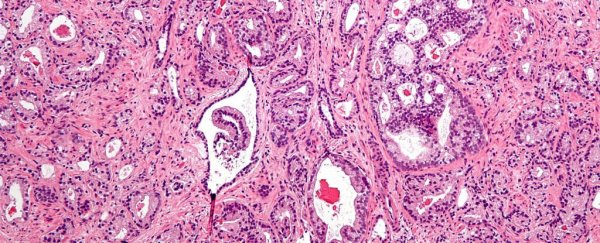Scientists have identified 11 compounds that have the potential to significantly improve the diagnosis and treatment of prostate cancer, and say they could be used to develop more targeted and effective drugs so even better treatments can be offered in the future. Right now, prostate cancer - like most other forms of the disease - is fought with drugs that damage healthy cells as well as cancerous ones.
To figure out if specific types of molecules can be more selective in the type of cell they target, researchers from four institutions across Russia looked at a cancer marker called the prostate specific membrane antigen (PSMA). Not only do prostate cancer tissues carry 10 times the level of PSMA proteins as healthy tissues, PSMAs also provide a highly effective way of spotting secondary tumours that may be present after the initial one has been removed.
With the PSMA identified, the scientists next looked at the three groups of molecules capable of binding to it: antibodies (proteins synthesised by the immune system), aptamers (peptide molecules or fragments of DNA/RNA), and ligands (more arbitrary substances that interact with the active centre of the molecule and enable it to perform its main function).
Through a detailed analysis, the team identified the ligands as having the best potential to offer a targeted approach to prostate cancer. They were then able to build on previous work in this area (which stretches back to the 1990s) and highlight a set of 11 promising cancer-fighting compounds based on plain, old urea.
Urea is used by all mammals to excrete nitrogen-containing waste (it's part of our urine) and has long been of interest to cancer specialists because of the way it can be modified to block DNA replication and thus the division of cancerous cells.
The 11 substances are now being tested in clinical trials, having demonstrated the necessary characteristics at the stage of preclinical studies, the team reports. They say it's impossible to know how soon (or if) PSMA ligands will appear in the clinic, but the results so far are encouraging.
"[T]he fact that the PSMA-diagnostics allows the monitoring of tumour growth and development of metastasis makes this an attractive target for future developments of drugs," said one of the researchers, Anastasia Aladinskaya from the Moscow Institute of Physics and Technology. "The first results are already there, and they are very promising."
According to the US National Cancer Institute, prostate cancer is the second most common cancer in men after skin cancer, and despite the fact that most men don't die from the disease, it's still the second most common cause of cancer-related death in the US after lung cancer. A more effective treatment would affect a lot of lives in the future.
The study has been published in the Journal of Drug Targeting.
